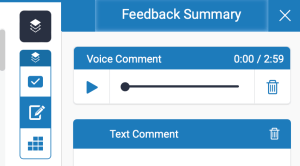We are continually seeking ways to make feedback more useful for students and the process more efficient for staff. In the 22/23 NSS, our Assessment and Feedback positivity rate placed the University of Lincoln 55th out of 131 institutions. This, alongside bottom 40% rankings for both Accounting and Finance subject areas in the question How often does feedback help you improve your work? highlighted room for improvement.
We decided to trial the use of the voice comments function within Turnitin, thinking that verbal comments could provide individual student feedback more efficiently, and supplement the detail given by the rubric – as staff are required to use rubrics, and this appears to reduce personalised comments. We were not aware of anyone else in the department who had used this technique, which was supported by student comments confirming that they had not received verbal feedback before.
Students were tasked with a 1250-word summative reflection assessment as part of their taxation/personal finance module. Turnitin feedback mediums were utilised including detailed assessment rubrics, written comments and recorded audio feedback. Quickmark comments were also incorporated on some scripts.
Audio comments are restricted by Turnitin to three minutes per student and we prioritised specific examples of practice, as well as offering suggestions for improvements. Once marks had been released, a student evaluation survey of the feedback method was run across both modules to capture the student perceptions of the new approach. The survey had 33 responses from a possible 84 students (39.3% response rate).

The impact of using voice comments was significant with 31 of the 33 students confirming it was a more personal way of receiving feedback. Qualitative comments included:
‘I think the audio feedback received was by far the best feedback I have received throughout my degree. The detail and explanation within the feedback was far greater than any written feedback.’
‘I have often felt disappointed when receiving short / seemingly low effort written feedback on work that has taken a significant time and effort to produce, often providing little insight on specific areas to improve. The use of audio feedback reflected the effort I had made and provided clear insights into how I could improve.’
‘Writing usually bland and seems unspecific. Audio allows for more personal feel…’
‘I liked the audio feedback as it felt personalised and truthful to my piece of work…’
There was also a clear preference for a mixed approach to feedback. When asked, ‘which method of feedback do you prefer to be given?’ 64% responded ‘written, rubric and audio’ and 18% responded ‘rubric and audio’.
This was corroborated in qualitative comments:
‘The new audio feedback was helpful as it felt personal and marker could also say a lot more in a short audio message than they could in a written message, however I also like the written feedback as it can be short and straight to the point. The rubric is also useful as I like to see where I fit in each category.’
‘The audio feedback provides a more personalised method of feedback … Rubric feedback is useful to visually interpret strong/weak areas quickly and provide insight into how your mark was decided. Written/In text comments are useful when there are specific areas… The combination of all of these methods provides the best feedback.’
‘…a combination allows for a rounded comprehension of both success and areas to work on.’
We have also received positive comments from the External Examiner, ‘I see you are providing audio feedback to the students, which I think is a really good idea. I haven’t seen it done previously’, confirming it is not commonplace within our subject areas. He also agreed, ‘providing written feedback is simultaneously more difficult and less useful’.
The teaching team involved also agreed that using audio comments allowed a greater depth of feedback, made the process more efficient and was much more enjoyable than their previous marking experiences.
